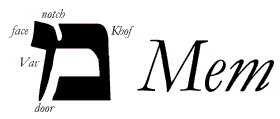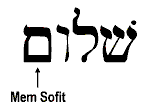|
|
 |
|
|
 |
 |
 |
 |
 |
|
 |
 |
 |
 |
 |
|
Advanced Information
|
|
|
|
 |
|
|
|
The letter Mem is the 13th letter of the Aleph-Bet, having the numeric value of 40. The pictograph for Mem looks like a wave of water, whereas the classical Hebrew script (Ketav Ashurit) is constructed of a Kaf with a Vav beside it:

Note that the gematria for these components equals the value for the Divine Name.
Mem is the second of the "double letters" in Hebrew, having both a "medial" form (pesucha) and an ending form (stumah).
- The Mystery of Mem
In Jewish Mysticism, Mem is the letter of "water" (mayim), symbolizing the "spring" of the Torah. Just as the waters of an underground spring rise upward from an unknown source to reveal themselves, so does the spring of wisdom rise up from the mysterious Source that is God. This flowing stream of the inner wisdom can be expressed through the gift of man's speech:

"The words a man speaks are deep waters, A flowing stream, a fountain of wisdom." (Proverbs 18:4)
- The Meaning of Mem
Traditionally, Mem has several related meanings: "waters," "people," "nations," "languages," and "tongues." The name of the letter probably signifies water itself, and its most ancient forms bore a resemblance to waves of water. As such, Mem represents the sea of Torah, the ocean of Talmud, knowledge, wisdom, etc.
- Open and Closed Mem
As mentioned above, Mem has two forms: an open form and a closed form. The open form (pesucha) is said to represent the revealed truth of God (as demonstrated by Moses), whereas the closed form (stumah) is said to represent the concealed truth of God (as demonstrated by the Mashiach, the revealer of mysteries).

"Then the disciples came and said to him, "Why do you speak to them in parables?" And he answered them, "To you it has been given to know the mysteries of the kingdom of heaven, but to them it has not been given." (Matt 13:10-11).
- The Messiah and the Closed Mem
In Isaiah 9:7, a closed Mem appears where an open Mem normally should appear. In the phrase lemarbeh hamisrah, "his rule will be increased," the Mem in lemarbeh is a final (closed) Mem:
![Proverbs 9:6[7h] (BHS)](../../../../Grammar/Unit_One/Aleph-Bet/Mem/isaiah9-7closedmem.gif)
The Jewish sages have said that this passage was originally about righteous King Hezekiah, a type of Mashiach (Messiah). However, since he failed to offer shirah (a song of praise) to the LORD on account of the destruction of Sennacherib's army, the open Mem was "closed off," and the advancement of the royal rule from Judah blocked until the coming of the true Mashiach. Now the closed Mem represents the era of Mashiach, when He shall reign upon the earth and there shall be no end to His healing peace.
Interestingly, as Messianic believers, the passage from Isaiah 9:6-7 is a clear reference to the deity of Yeshua as God the Son, the Lion from the tribe of Judah:
![Proverbs 9:6[7h] (BHS)](../../../../Grammar/Unit_One/Aleph-Bet/Mem/isa9-6.gif)
For unto us a child is born, unto us a son is given: and the government shall be upon his shoulder: and his name shall be called Wonderful, Counsellor, The mighty God, The everlasting Father, The Prince of Peace. (Isa 9:6)
![Proverbs 9:7[8h] (BHS)](../../../../Grammar/Unit_One/Aleph-Bet/Mem/isa9-7.gif)
Of the increase of his government and peace there shall be no end, upon the throne of David, and upon his kingdom, to order it, and to establish it with judgment and with justice from henceforth even for ever. The zeal of the LORD of hosts will perform this. (Isa 9:7)
- Gematria of Mem
As indicated above, the letter Mem is composed of two parts: a Vav and a Kaf. The gematria of these parts is 26, the same value for the sacred Name YHVH. In traditional Hebrew gematria, Mem has the value of 40, and is thereby associated with the following:
- 40 days and nights of flood waters
- 40 years in the wilderness
- 40 days Moses was upon Mount Sinai
- 40 days of Selichot (teshuvah before Rosh Hashanah)
- 40 days of fasting by our LORD Yeshua the Mashiach
- 40 days from conception to the initial "formation" of the fetus
- 40 weeks of gestation until birth
- 40 years of age before a man develops insight
- Mem represents divine Omnipresence
A Hebrew Name of God is makom, meaning "place." Note that this Name includes both an open and a closed Mem:

The sages have taught that God's Presence is both open and revelatory, yet is also shrouded in deep mystery, closed off to the apprehension of human reason.
- Mem represents two aspects of God's rule
Mem is also said to represent two aspects of God's rule: malkhut (kingship) and memshalah (dominion), as indicated in Psalm 145:13:

- Oversized Mem
An oversized Mem appears in the word Mishlei in Proverbs 1:1:

According to some scribal traditions, the Mem is here enlarged because Solomon is said to have fasted 40 days and 40 nights before writing the Proverbs, in order to emulate Moses and to prepare himself for the "open" revelation from the LORD.
- Jesus gives the Living Water
The Lord Jesus is the only One who truly satisfies the inner thirst we have for real life and ultimate satisfaction. Emunah (faith) in Him yields refreshment and healing for those whom He has called as His own:

|
|
|
Hebrew for Christians
Copyright © John J. Parsons
All rights reserved.
|
|
|
|
 |
|
|
|
|
|
|















![Proverbs 9:6[7h] (BHS)](../../../../Grammar/Unit_One/Aleph-Bet/Mem/isaiah9-7closedmem.gif)
![Proverbs 9:6[7h] (BHS)](../../../../Grammar/Unit_One/Aleph-Bet/Mem/isa9-6.gif)
![Proverbs 9:7[8h] (BHS)](../../../../Grammar/Unit_One/Aleph-Bet/Mem/isa9-7.gif)


